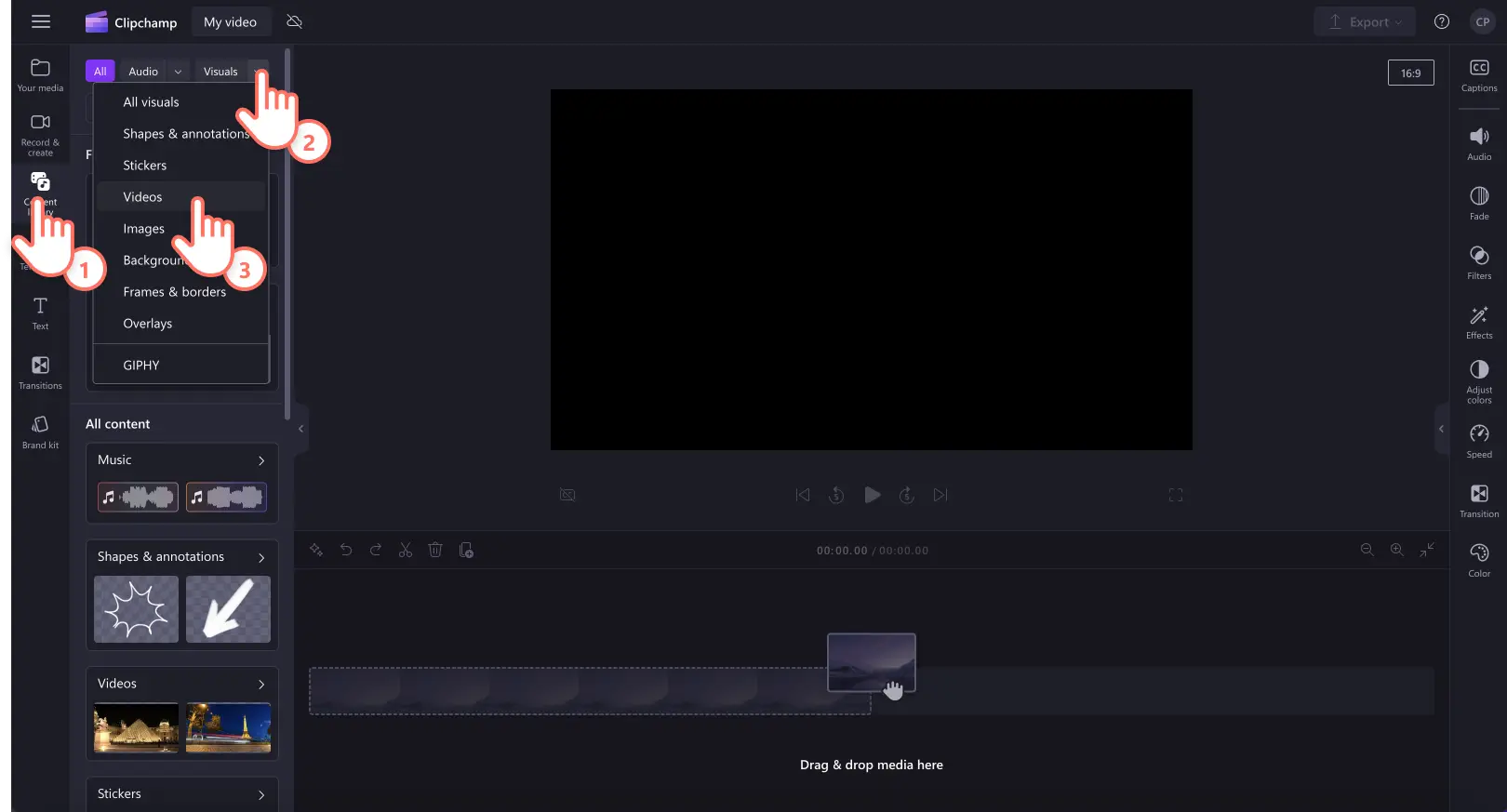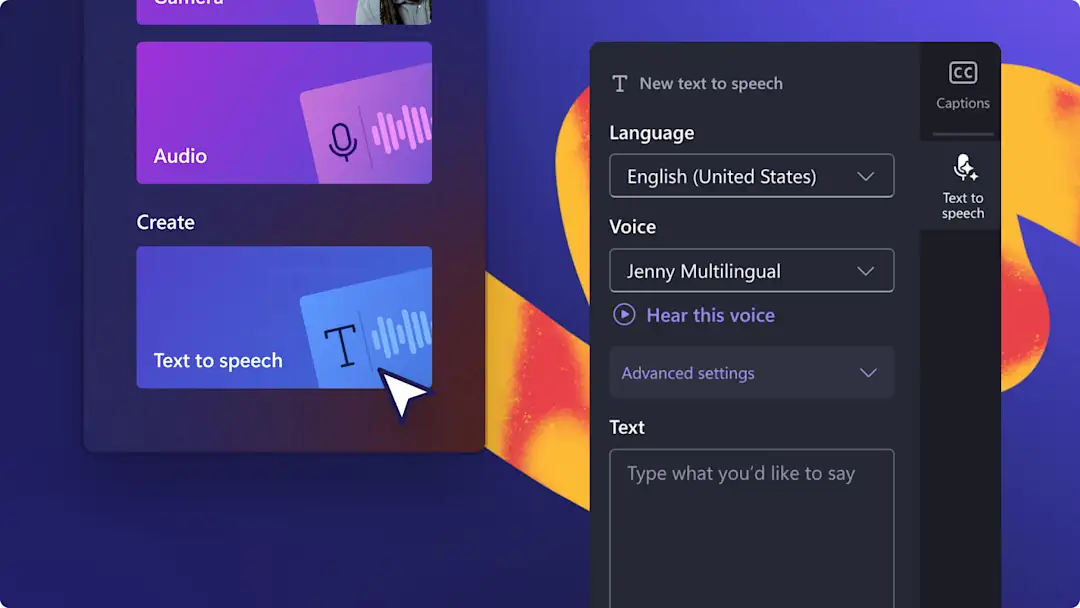Heads up! This content is relevant for Clipchamp for personal accounts. Try this link If you're looking for information about Clipchamp for work accounts.
On this page
Want to create a lifelike voiceover for a gaming highlight, corporate presentation, or TikTok video? Generate inclusive AI voiceovers to improve accessibility and engagement no matter what you're creating.
The free AI voice generator lets you create professional voiceovers in seconds if you don’t want to record your own voice or hire talent. Select from a wide range of languages, voices, speeds, and emotions to make a unique voiceover. Read on to explore how to create an AI voiceover with the text to speech feature in Clipchamp.
How to use our free voiceover generator
Step 1. Import videos or select stock footage
To import your own videos, photos, and audio, click on the import media button in the your media tab on the toolbar to browse your computer files, or connect your OneDrive.
You can also use free stock media like video clips, video backgrounds, and stock music. Click on the content library tab on the toolbar and click on the visuals drop down arrow, then videos. Search through the different stock categories using the search bar as well.
Drag and drop your video onto the timeline.
Step 2. Create an AI voiceover
Click on the record & create tab, then click on the text to speech option.
The text to speech tab will appear on the property panel.
Next, click on the drop down arrow to select from a range of language including Japanese, Spanish, Italian, Greek, Hindi, French, and many more. Click on your desired language to select it.
Next, choose your voice. Click on the voice drop down arrow to see all of the voice options. Each language will have different voice options available. You can click on the hear this voice button to listen to a preview of your selected voice style.
You can also adjust your pitch and pace using the advanced settings drop down arrow. Choose from different pitch options like extra low, low, medium, high, and extra high.
To edit the pace of your voiceover, use the pace slider. Drag the slider to the left to slow down your voiceover, or drag the slider to the right to speed up your voiceover.
Next, add your text to the text box. Type in what you’d like to say in your voiceover into the text box on the property panel. Remember there is a maximum duration of 10 minutes per voiceover. Once you have added your text, click on the preview button to listen to your voiceover. Click on the save button to add your voiceover to your video.
Your voiceover will automatically save as an MP3 audio file on your timeline below your video clip.
Step 3. Preview and save your video
Before saving your video, make sure to preview by clicking on the play button. When you’re ready to save, click on the export button and select a video resolution.
How to edit or delete an AI voiceover
If you want to make changes to your voiceover after saving it, just click on your voiceover on the timeline, then click the text to speech tab on the property panel. Edit your text, then click on the save button to save your changes. To remove your voiceover from your video, just press the delete button on your keyboard.
Voiceover video ideas and examples
Create voiceovers for educational videos
Share training instructions in tutorials and how-to videos quickly and easily.
Easily explain complex topics using a voice recording in training videos.
Polish presentations and make virtual learning content more engaging by highlighting valuable lesson plans with the voiceover maker.
Add voiceovers to marketing videos
Easily explain new features or functions while sharing how something works using voiceovers in product demos.
Communicate your brand's message and connect with your viewers through voice in marketing and promo videos.
AI voices can create consistent corporate videos, reimagine culture videos with narration, and refine training videos and screen recordings.
Narrate your story on social media
Add context, explanations, and narration to slideshow videos and documentaries.
Express your characters’ thoughts, feelings, and internal monologue in short films.
Add personality and enhance storytelling in travel highlight videos for social media.
Writing tips for your AI voiceover
Use punctuation to make impactful speed changes to your text to speech voiceover:
Full stops add a moderate pause to your text to speech.
Commas add a short pause to your text to speech.
Ellipses (“ …”) add a long pause in your voiceover.
Question marks change the intonation of your voiceover.
Exclamation marks will not change the delivery of your text to speech.
Typing in all caps will not change the delivery of your voiceover.
Watch the AI voiceover tutorial
Frequently asked questions
What languages are available in the voiceover generator?
There are over 80 different languages users can create AI voiceovers in for free. Some popular languages include Spanish, Japanese, Hindi, Italian, Arabic, German, and French. For the full list of languages, please refer to our AI voiceover help article.
How do I fix incorrect pronunciation on the AI voice generator?
If your text to speech isn’t pronouncing a word correctly, try intentionally misspelling the word (spelling it as it sounds). For numbers, write them out in full for example, 2024 becomes “two thousand and twenty-four.”
Can I record my own voice instead of creating an AI voiceover?
Yes. Easily record your own voice with the voice recorder to add a unique touch to any video.
Can I add subtitles to my video voiceover?
Yes. We highly recommend adding subtitles to videos that include an AI voiceover or voice recording using the subtitle generator. Captions are essential for increasing your video's accessibility and online reach.
For more help making your videos more engaging, check out how to add subtitles to videos, or explore how to use the AI audio enhancer.
Create AI voiceovers today with Clipchamp or download the Microsoft Clipchamp Windows app.
















